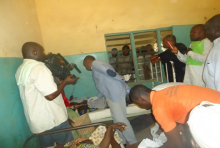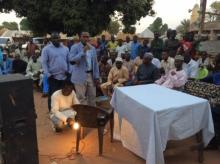CSM Outbreak-Niger State and Federal Government Strengthen Response System
Abuja, 27 March 2017 - Following the reported cases of Cerebrospinal Meningitis (CSM) in four(4) local government areas (LGAs), the Niger state government in north central Nigeria has activated one of the most robust CSM disease outbreak preparedness and responses yet. With close to 60 suspected cases so far, the state has taken major steps including the appointment Dr Mustapha Jibril, the Commissioner for Health, to lead the state response in close coordination with the World Health Organization (WHO).
Reports available at the WHO country office indicate that as at epidemiological week 11, a total of 1,407 cases with 211 deaths were reported from five (5) states in the northern part of Nigeria. The current outbreak is predominantly due to Neisseria Meningitis serotype C (Nm C). Initial reactive vaccination campaign was conducted in Zamfara state last week and plan is underway to conduct reactive vaccination in additional wards that passed the epidemic threshold in the state.
In Niger which is reporting current cases, the state has also adopted the WHO Revised Guidance on Meningitis Outbreak Response in sub-Saharan Africa, and moved fast towards accelerated implementation of key recommendations made by WHO and the state Outbreak and Rapid Response Committee in the wake of the CSM alert.
Steps taken so far include strengthening and intensification of CSM surveillance at all levels, procurement and pre-positioning of parenteral ceftriaxone (preferred antibiotic) in designated hospitals for case management. Other measures to halt further fatalities involved sensitization of community leaders, activation of CSM alert and Response System targeted at schools and other institutions such as barracks and prisons, and launching of a mass media awareness and sensitization campaign, using all available channels including the TV and radio stations.
Just hours after the state crossed the CSM ‘alert threshold’ (3 cases per 100,000 population/week), the Commissioner for Health, Dr. Jibril, held a press briefing to give early warning to the citizens and outlined a broad epidemic preparedness and response plan currently being implemented by the state to bring the situation under control.
“This was a timely move that will no doubt mobilize the citizens to take all necessary precautions to safeguard their health; the quick response of government in alerting citizens to this current CSM situation is unprecedented in the history of our state”, remarked a senior government official from the Ministry of Information.
WHO is supporting the state by providing ongoing technical support in strengthening surveillance, investigation of suspected cases, and building capacity of health workers in epidemic preparedness, case detection, reporting and case management. Already, WHO has made donation of Rapid Diagnostic Test Kits (Pastorex) to enable early confirmation of causative organism and quick response. Three samples tested positive for Neisseria meningitides serotype C (NmC) using Pastorex.
According to Mr Fadinding Manneh the WHO Zonal Coordinator in the north central zone, , “one of our strategic objectives in responding to this CSM Alert is to support the state initiate and put in place appropriate preparedness and control measures in case we get to the epidemic threshold. He added, “We have already activated necessary processes by facilitating transportation of already collected positive samples to the reference laboratory in Lagos for confirmation using polymerase chain reaction (PCR)”.
Some settlements in three of the four LGAs currently affected in Niger State share common borders with Kebbi State, which has also reported cases of CSM due to NmC.
Meningitis is an inflammation of d meninges. Symptoms include meningeal symptoms stiff neck, fever -usually>38.0 °C, and headache, cerebrospinal fluid pleocytosis (excessive lymphocytes. There may also be altered consciousness/altered mental status,-nausea and vomiting among others. Meningitis is easily spread when people live in close quarters. Being in small spaces increase the chance of exposure. Examples of these locations include college dormitories, boarding schools, barracks, IDP camps, slums and day care centers
It would be recalled that Nigeria in 2015 completed the conduct of mass campaign of CSM targeting the commonest cause of epidemic meningitis (Serotype A of Niseeria orgnanism) in the 26 states of the country that are in the Meningitis belt of Africa, a region in sub-Saharan Africa where the rate of incidence of meningitis is very high. This region stretches from Senegal up to the Horn of Africa.
For more information, please contact:
Technical contacts:
Dr Mary Stephen; Tel: +234 803 639 1332; Email: %20%20%20%20%C2%A0stephenm [at] who.int ( stephenm[at]who[dot]int)
Mr Fadinding Manneh; Tel: +234 803 535 4872; Email: mannef [at] who.int
Media contacts:
Ms Charity Warigon; Tel: +234 810 221 0093; Email: %20%20%20%20%C2%A0warigonc [at] who.int ( warigonc[at]who[dot]int)
Below:
1- Commissioner addressing community members in Mazakari village of Niger state
2- Dr Jibril examining a suspected CSM patient at the Basic Health Center in Ibeto community of Niger state





